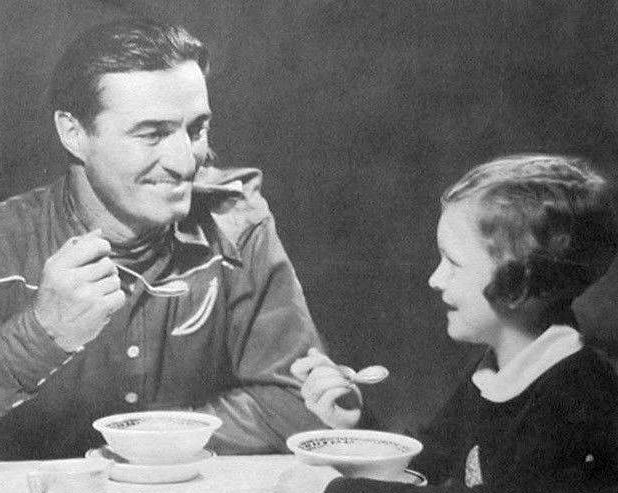“Howdee, Straight Shooters! Howdee!”
The man born Thomas Hezikiah Mix in Mix Run, Pennsylvania in 1880 became a Western legend during the 20th century…and he did it using the same good old fashioned skill as Buffalo Bill Cody: salesmanship! Tom Mix would be recognized as a genuine cowboy and soldier of fortune — even though some of his exploits were a bit exaggerated. (For example, Mix did not serve with Teddy Roosevelt’s “Rough Riders.”) However, Mix did become a champion rodeo rider, winning a national championship in 1909. In that same year, an appearance in a short produced by the Selig Polyscope Company—The Cowboy Millionaire—started him on a career that made him Hollywood’s first big Western film star. Tom’s popularity would even cross over to radio, when The Tom Mix Ralston Straight Shooters premiered over NBC on this date in 1933.
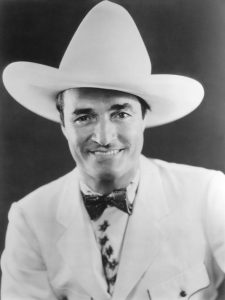 In the silent film era, Tom Mix made close to 100 short films for Selig Polyscope before the company went belly up in 1917. Mix then signed a contract with Fox Film (where he would eventually earn $7,500 a week) and continued to produce solid two-reel actioners until his first starring feature, Cupid’s Round Up, was released in 1918. Tom would later work with such silent screen sirens as Colleen Moore (The Wilderness Trail, The Cyclone) and Clara Bow (The Best Bad Man) and under the direction of big names like John Ford (Three Jumps Ahead, North of Hudson Bay) and George Marshall (Prairie Trails, After Your Own Heart). Many of Tom Mix’s classic oaters have been lost to the ravages of time and neglect…but new generations of silent western fans continue to enjoy the likes of Sky High (1922—named to the National Film Registry in 1998), Riders of the Purple Sage (1925), and The Great K&A Train Robbery (1926).
In the silent film era, Tom Mix made close to 100 short films for Selig Polyscope before the company went belly up in 1917. Mix then signed a contract with Fox Film (where he would eventually earn $7,500 a week) and continued to produce solid two-reel actioners until his first starring feature, Cupid’s Round Up, was released in 1918. Tom would later work with such silent screen sirens as Colleen Moore (The Wilderness Trail, The Cyclone) and Clara Bow (The Best Bad Man) and under the direction of big names like John Ford (Three Jumps Ahead, North of Hudson Bay) and George Marshall (Prairie Trails, After Your Own Heart). Many of Tom Mix’s classic oaters have been lost to the ravages of time and neglect…but new generations of silent western fans continue to enjoy the likes of Sky High (1922—named to the National Film Registry in 1998), Riders of the Purple Sage (1925), and The Great K&A Train Robbery (1926).
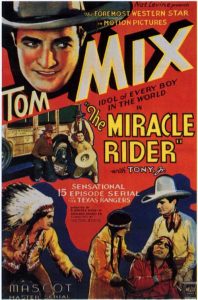 When Fox declined to renew his contract (among other things, Tom Mix was a victim of his own hefty salary), Tom worked briefly in vaudeville before signing a contract with Film Booking Offices of America in 1928. He was contracted to make six westerns but wound up one short. (His FBO oaters were not as well received as his Fox features, and the sixth to be produced, The Dude Ranch, was scrapped). The film star then returned to vaudeville and a two-year stint with the Sells Fioto Circus before Universal came a-calling, signing him up for nine westerns (plus a cameo in a non-western, The Cohens and Kellys in Hollywood) that returned Mix to box office glory. A bout of influenza and some other injuries forced Tom to end his association with the studio, and Tom returned to live performances. He partnered with Sam Gill in 1934 to form “Tom Mix Wild West and Sam Gill Circus (Combined).” When Gill died from a heart attack, Mix made plans to buy out his partner’s share of the business…and to finance the deal, he made his final film. This 15-chapter serial for Nat Levine’s Mascot studio was entitled The Miracle Rider (1935). Rider was a box office success…but it was Tom Mix’s cinematic swan song.
When Fox declined to renew his contract (among other things, Tom Mix was a victim of his own hefty salary), Tom worked briefly in vaudeville before signing a contract with Film Booking Offices of America in 1928. He was contracted to make six westerns but wound up one short. (His FBO oaters were not as well received as his Fox features, and the sixth to be produced, The Dude Ranch, was scrapped). The film star then returned to vaudeville and a two-year stint with the Sells Fioto Circus before Universal came a-calling, signing him up for nine westerns (plus a cameo in a non-western, The Cohens and Kellys in Hollywood) that returned Mix to box office glory. A bout of influenza and some other injuries forced Tom to end his association with the studio, and Tom returned to live performances. He partnered with Sam Gill in 1934 to form “Tom Mix Wild West and Sam Gill Circus (Combined).” When Gill died from a heart attack, Mix made plans to buy out his partner’s share of the business…and to finance the deal, he made his final film. This 15-chapter serial for Nat Levine’s Mascot studio was entitled The Miracle Rider (1935). Rider was a box office success…but it was Tom Mix’s cinematic swan song.
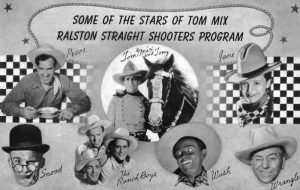 It was the Ralston-Purina company who ensured that Tom Mix would still be remembered after his tragic death from an automobile accident in 1940. The company purchased the rights to use his name for a thrice weekly quarter-hour series. According to radio historian Jim Harmon (author of The Great Radio Heroes), the action on this program took place at Mix’s ranch (the T-M Bar) near Dobie Township in Texas (but of course!). Tom maintained the spread with his two young wards, Jimmy and Jane …and an elderly codger nicknamed “The Old Wrangler,” who would usher in each broadcast with: “Let’s get a-goin’!” When the actor who played the Wrangler (Percy Hemus) went off to join the Ghost Riders in the Sky, the character of Sheriff Mike Shaw was introduced as Tom’s new sidekick. Other regulars on the show included chief-cook-and-bottle-washer Wash, Tom’s pal Pecos Williams, and Amos Q. Snood—the miserly hotel owner in Dobie.
It was the Ralston-Purina company who ensured that Tom Mix would still be remembered after his tragic death from an automobile accident in 1940. The company purchased the rights to use his name for a thrice weekly quarter-hour series. According to radio historian Jim Harmon (author of The Great Radio Heroes), the action on this program took place at Mix’s ranch (the T-M Bar) near Dobie Township in Texas (but of course!). Tom maintained the spread with his two young wards, Jimmy and Jane …and an elderly codger nicknamed “The Old Wrangler,” who would usher in each broadcast with: “Let’s get a-goin’!” When the actor who played the Wrangler (Percy Hemus) went off to join the Ghost Riders in the Sky, the character of Sheriff Mike Shaw was introduced as Tom’s new sidekick. Other regulars on the show included chief-cook-and-bottle-washer Wash, Tom’s pal Pecos Williams, and Amos Q. Snood—the miserly hotel owner in Dobie.
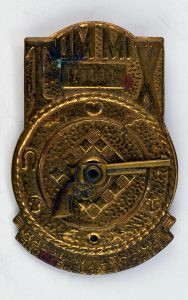 There was little doubt as to who the star of The Tom Mix Ralston Straight Shooters was…and that was the titular cowboy. His serialized adventures had him squaring off against a continual array of evildoers that included rustlers, killers, and (once World War II was underway) saboteurs and spies. At the height of its popularity, Tom Mix was billed as “radio’s biggest western-detective program.” According to old-time radio historian John Dunning, Tom’s adventures consistently ranked among the most popular during “the wheat-and-barley hour.”
There was little doubt as to who the star of The Tom Mix Ralston Straight Shooters was…and that was the titular cowboy. His serialized adventures had him squaring off against a continual array of evildoers that included rustlers, killers, and (once World War II was underway) saboteurs and spies. At the height of its popularity, Tom Mix was billed as “radio’s biggest western-detective program.” According to old-time radio historian John Dunning, Tom’s adventures consistently ranked among the most popular during “the wheat-and-barley hour.”
Ralston-Purina—who advertised on the show from its 1933 premiere until it departed the airwaves on December 16, 1951—was the show’s only sponsor. They rewarded loyal listeners with such dime-and-boxtops swag as decoders, comics, badges, and other kiddie baubles. The Tom Mix Ralston Straight Shooters was truly one of radio’s greatest premium givers, and that can’t-get-it-out-of-my-head theme song remains one the best remembered of Radio’s Golden Age (sung to the tune of When the Bloom is On the Sage):
Shre-ea-ded Ralston for your breakfast
Start the day off shinin’ bright
Gives you lots of cowboy energy
With a flavor that’s just right
It’s delicious and nutritious
Bite-size and ready to eat
Take a tip from Tom
Go and tell your mom
Shredded Ralston can’t be beat!
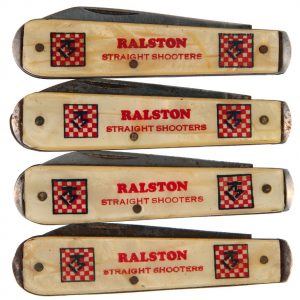 As previously noted, the show’s namesake went to a better world than this one in 1940…so who replaced Tom Mix on the radio show after his passing? Truth be told—Tom Mix gave little to Ralston Straight Shooters other than his name and a bit of his Western legend glory. Tom never emoted on the program—his voice suffered due to some broken noses and a bullet to his throat in more adventurous times. He was portrayed by Artells Dickson when the show premiered in 1933. Jack Holden took over in 1937, followed by Russell Thorson, and Joe “Curley” Bradley. Joe played Tom the longest—from June 5, 1944 until the show’s final curtain call. Harold Peary and Willard Waterman (the future stars of The Great Gildersleeve) played multiple roles on the series, as did ”Lonesome” George Gobel.
As previously noted, the show’s namesake went to a better world than this one in 1940…so who replaced Tom Mix on the radio show after his passing? Truth be told—Tom Mix gave little to Ralston Straight Shooters other than his name and a bit of his Western legend glory. Tom never emoted on the program—his voice suffered due to some broken noses and a bullet to his throat in more adventurous times. He was portrayed by Artells Dickson when the show premiered in 1933. Jack Holden took over in 1937, followed by Russell Thorson, and Joe “Curley” Bradley. Joe played Tom the longest—from June 5, 1944 until the show’s final curtain call. Harold Peary and Willard Waterman (the future stars of The Great Gildersleeve) played multiple roles on the series, as did ”Lonesome” George Gobel.
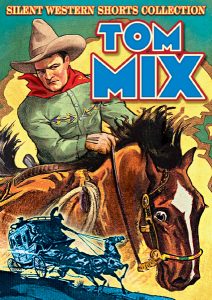 One of the tragedies of old-time radio is that while some broadcasts of The Tom Mix Ralston Straight Shooters have survived, they only number an estimated thirty or so (which is always sad to hear, particularly since the show was serialized). However, Radio Spirits does offer a collection of Tom Mix western shorts—two hours of adventures from his Selig Polyscope period, including Cactus Jim (1915) and An Angelic Attitude (1916). You can also check out Tom’s valedictory film/serial, The Miracle Rider, in our Vintage Western Serials compendium. Travel back in time with the “King of Cowboys”…and don’t forget Tony—his “wonder horse”!
One of the tragedies of old-time radio is that while some broadcasts of The Tom Mix Ralston Straight Shooters have survived, they only number an estimated thirty or so (which is always sad to hear, particularly since the show was serialized). However, Radio Spirits does offer a collection of Tom Mix western shorts—two hours of adventures from his Selig Polyscope period, including Cactus Jim (1915) and An Angelic Attitude (1916). You can also check out Tom’s valedictory film/serial, The Miracle Rider, in our Vintage Western Serials compendium. Travel back in time with the “King of Cowboys”…and don’t forget Tony—his “wonder horse”!

